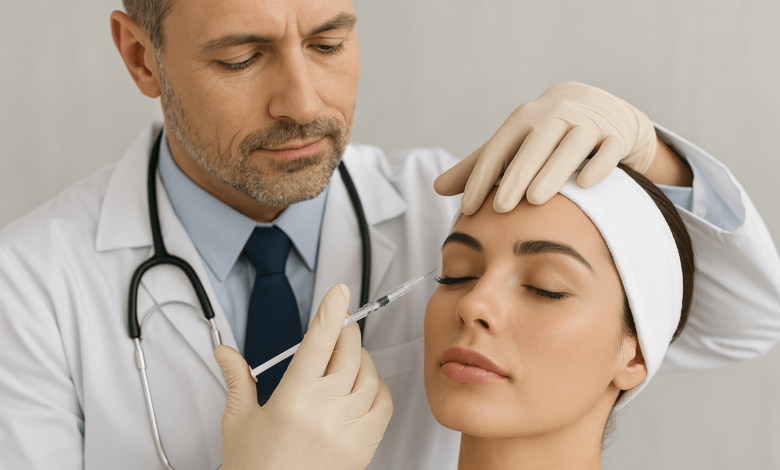Why Medical Professionals Are the Gold Standard in Cosmetic Injecting

In the world of aesthetic medicine, where precision, safety, and results are paramount, not all injectors are created equal. As cosmetic treatments become more popular and accessible, the importance of choosing a qualified, experienced practitioner has never been greater. For patients and clinics alike, medical professionals—especially doctors and registered nurses—are widely regarded as the gold standard in cosmetic injecting.
Their clinical training, ethical grounding, and ability to assess and manage complications provide a level of care that goes far beyond the surface. In this post, we’ll explore why medically qualified professionals continue to lead the way in non-surgical aesthetics and why their role is critical in upholding the highest standards of patient care.
Table of Contents
Medical Training Equals Deep Anatomical Knowledge
Precision Starts with Anatomy
Understanding facial anatomy is essential when it comes to cosmetic injecting. Medical professionals are trained extensively in musculature, vascular pathways, and tissue planes—knowledge that directly informs safer, more accurate injection techniques.
Through a well-designed Cosmetic Injector Course, practitioners can translate their clinical expertise into aesthetic applications. This foundation not only improves treatment outcomes but also helps reduce risks such as bruising, asymmetry, or vascular compromise.
Recognising the Subtle Signs of Complications
One of the biggest advantages medical professionals bring to aesthetic medicine is their ability to identify and respond to complications quickly. Issues like vascular occlusion or delayed hypersensitivity reactions require a trained eye and decisive action.
A comprehensive Cosmetic Injectables Course equips clinicians with the protocols and confidence to act swiftly, ensuring the patient’s safety is always the top priority. This level of preparedness gives patients peace of mind and protects the integrity of the practice.
A Commitment to Ethical and Safe Practice
Upholding Informed Consent and Transparency
Medical professionals are legally and ethically bound to obtain informed consent, explain risks clearly, and document each procedure thoroughly. These practices are second nature in clinical environments and are just as important in cosmetic medicine.
When training through a structured Cosmetic Injection Course, practitioners reinforce their understanding of legal responsibilities, patient communication, and documentation standards. This promotes trust and transparency at every step of the treatment journey.
Evidence-Based Decision Making
Healthcare professionals rely on scientific data and clinical guidelines to inform their decisions. This evidence-based approach is crucial in aesthetic medicine, where new products and techniques are regularly introduced.
Rather than following trends blindly, medical injectors are taught to critically assess product efficacy, technique suitability, and patient-specific factors. These principles are deeply embedded in every high-quality Cosmetic Injector Course curriculum.
Superior Patient Communication and Holistic Care
Building Trust Through Clinical Communication
Patients often approach aesthetic treatments with hesitation, questions, and personal insecurities. Medical professionals are uniquely trained to communicate with empathy and clarity, helping patients feel understood and supported.
This ability to establish rapport is not just a soft skill—it’s a critical component of delivering excellent care. In a Cosmetic Injectables Course, healthcare practitioners learn how to conduct thorough consultations, manage expectations, and deliver realistic results based on ethical practice.
Seeing the Bigger Picture: Health and Aesthetics Combined
Unlike non-medical injectors, clinicians are trained to consider a patient’s overall health, medical history, and psychological readiness. This allows for safer treatment planning and ensures patients receive care that supports their long-term well-being.
When a practitioner completes a Cosmetic Injection Course, they’re not just learning how to inject—they’re learning how to assess the patient as a whole, detect contraindications, and create treatment plans that prioritise safety and satisfaction.
Professional Regulation and Continuous Improvement
Accountability Through Licensing and Oversight
Registered nurses and doctors in Australia are regulated by the Australian Health Practitioner Regulation Agency (AHPRA), which ensures they meet professional standards and remain accountable for their actions. This adds a level of oversight that protects patients and promotes industry integrity.
Training programs like a Cosmetic Injector Course reinforce this responsibility, helping clinicians maintain best practices and adhere to industry regulations while expanding their scope of expertise.
Ongoing Education and Professional Development
One of the hallmarks of medical professionals is their commitment to continuous learning. In aesthetic medicine, where techniques and products evolve rapidly, this mindset ensures that patients receive the most current, safe, and effective treatments available.
Professionals who complete a Cosmetic Injectables Course are often more inclined to pursue advanced training, workshops, and certifications, staying ahead of emerging trends and techniques.
See also: Brad Palmer Belle Haven CT: Leading Social Impact Investment
The Patient Perspective: Why Experience Matters
Informed Patients Are Seeking Medical Providers
Patients today are more informed and cautious about who they choose for aesthetic procedures. They want injectors who are not only skilled but also medically trained to handle complications and ensure optimal results.
Medical professionals who have completed a Cosmetic Injection Course stand out in this competitive market by offering a level of clinical trust and credibility that patients are actively seeking.
Reputation Built on Safety and Outcomes
Ultimately, the most successful cosmetic injectors are those who deliver consistent, safe, and natural-looking results. Medical professionals bring a level of discipline, care, and professionalism that builds strong reputations and loyal client bases over time.
Their training, mindset, and adherence to ethical standards make them the most qualified to deliver the results patients want—safely, ethically, and beautifully.
Frequently Asked Questions (FAQ)
1. Why should I choose a medical professional for cosmetic injectables?
Medical professionals—such as doctors and registered nurses—are trained to understand facial anatomy, manage complications, and prioritise patient safety. Their clinical background ensures they approach each treatment with precision, ethical standards, and evidence-based care. Many complete a Cosmetic Injector Course to further specialise in aesthetic techniques and patient communication.
2. What qualifications are required to become a cosmetic injector in Australia?
In Australia, only registered healthcare professionals (such as nurses, doctors, and dentists) can legally perform cosmetic injectable treatments. They must complete recognised training programs, such as a Cosmetic Injectables Course, and comply with regulations set by the Australian Health Practitioner Regulation Agency (AHPRA).
3. How do medical professionals reduce the risk of complications during treatments?
Clinically trained injectors are educated in recognising early signs of complications like vascular occlusion or allergic reactions. Their ability to respond quickly and appropriately is critical for patient safety. A hands-on Cosmetic Injection Course reinforces emergency protocols and teaches best practices for avoiding and managing adverse events.
4. Can a non-medical person legally perform cosmetic injections?
No, in Australia, cosmetic injectables are classified as medical procedures and must be performed by registered health professionals. Performing these treatments without the proper qualifications is both illegal and unsafe. A Cosmetic Injector Course is specifically designed for those with a healthcare background, ensuring legal and ethical compliance.
5. Do medical professionals offer better cosmetic results than beauty therapists?
While beauty therapists may have experience in skin care, medical professionals bring deeper knowledge of facial anatomy and product pharmacology. This allows for more precise, customised, and safer results. Those who undergo a Cosmetic Injectables Course learn not just how to inject, but how to assess and treat each patient holistically for optimal aesthetic outcomes.
Conclusion
In a rapidly growing and highly visual industry, cosmetic injecting is about more than just aesthetics—it’s about trust, safety, and medical integrity. Healthcare professionals continue to lead the way by combining clinical skill with artistic precision, offering patients not just beautiful results, but peace of mind. As the demand for non-surgical treatments continues to rise, medical practitioners will remain the gold standard in delivering quality care and setting the bar for excellence in aesthetic medicine.



